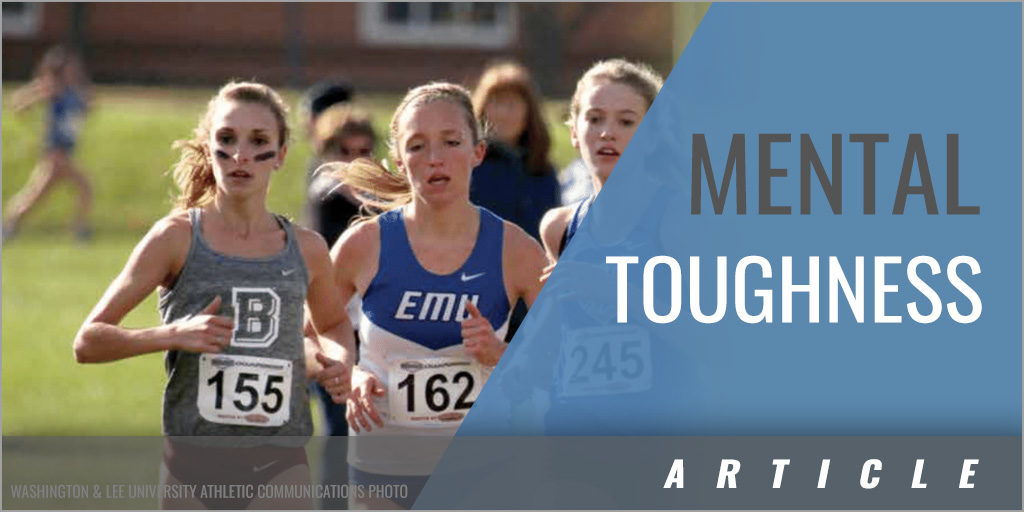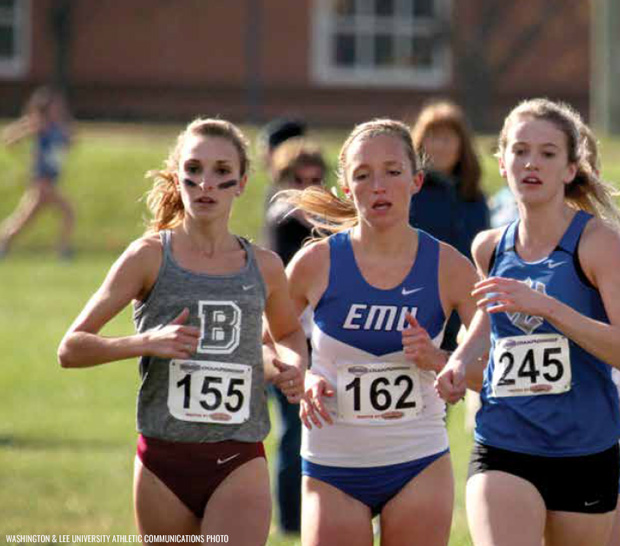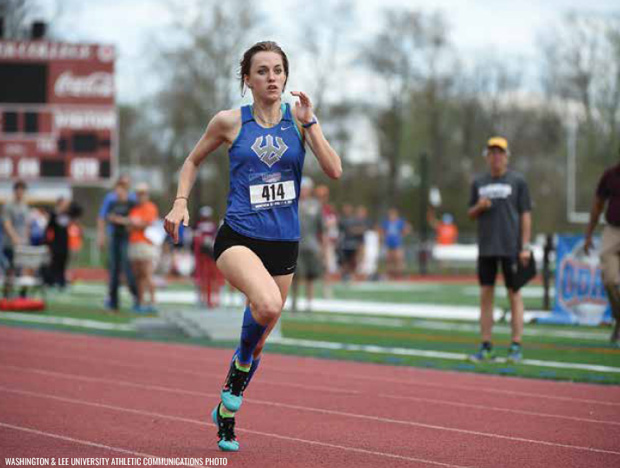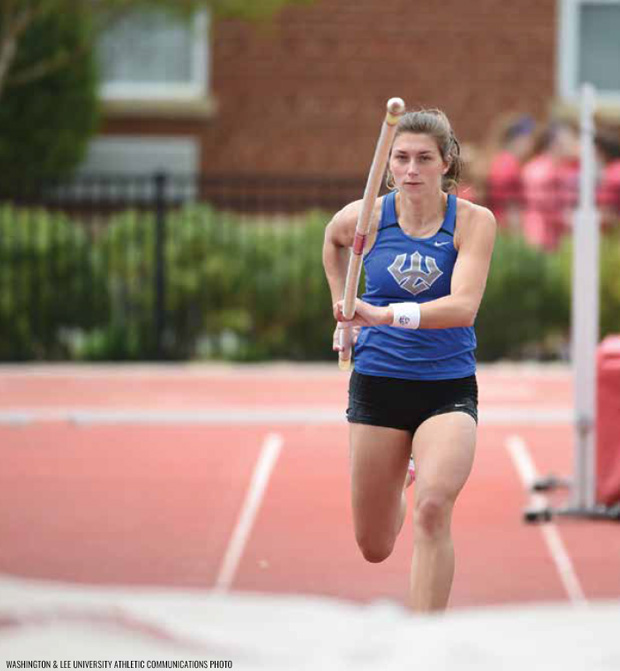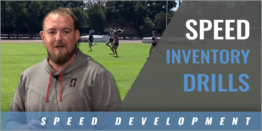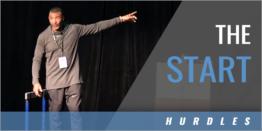|
By: Mike Dager and Dana Freeman Originally Published in: Techniques Magazine Provided by: USTFCCCA As coaches, we are always looking for ways to enhance the overall performance of our athletes. Each season, we create detailed training schedules with the hope of challenging our athletes to reach their physical potential. Because we realize the training can be both physically and mentally taxing, we make sure to also stress the importance of sleep, rest and recovery, fueling for success, adequate hydration, and remaining ahead of the academic demands of being a student-athlete. But what are we doing to mentally prepare our athletes for the competition itself? Can we help better prepare our student-athletes to adapt to changing conditions and unforeseen challenges once the gun goes off, once they step in the throwing circle or when they walk onto the high jump apron? With the ever growing popularity of sports psychology, coaches and athletes are becoming more aware of the benefits various forms of mental training might have on increasing the likelihood of athletic success. However, due to a limited amount of time to work with our athletes, it may seem like adding another component to our training routine would be nearly impossible.
A coach may even wonder if they are qualified to teach skills for enhancing the mental aspects of successful sports performance. For these reasons and others, considering the addition of a mental training component may seem both time consuming and overwhelming. A growing body of research suggests top-level athletes view mental preparedness as vitally important to their overall success, and exploring ways to develop mental toughness in our athletes is worthwhile. We would argue it is not only worthwhile, but also far easier to incorporate mental toughness training than one might think. In fact, you may already be structuring your practices in a way that would allow for simple tweaks that could offer significant results. So what exactly is mental toughness? Coaches and athletes often use the term to refer to the ability to remain focused during competition. Applied sports psychologists have worked to define what it means to have "mental toughness" for some time. Much of their research is qualitative in nature and involves interviewing top-level performers across a variety of sporting activities. Graham Jones, Sheldon Hanton and Declan Connaughton have teamed up on several occasions with the goal of better defining "mental toughness" and have created a framework of their research findings. In a 2002 study, the group stated "mental toughness is probably one of the most used but least understood terms in applied sports psychology." Hours of interviews and discussions with world-class athletes resulted in the creation of a framework for what it means to be mentally tough or have mental toughness. In general, the group states if you are a mentally tough athlete, you would be able to "cope better than your opponents with the many demands (competition, training, lifestyle, etc.) that sport places on the performer." Specifically, as a mentally tough athlete you are "more consistent and better than your opponent in remaining determined, focused, confident and in control under pressure" (Jones, Hanton, Connaughton 2002.) Throughout a competition, any number of things could occur to test an athlete's mental toughness. It is relatively easy to observe who gets rattled and suffers a drop in performance versus who managed to overcome additional external stresses associated with a com-petition. A logical question might be: Where is this mental toughness coming from? Many assume some athletes are just born with mental toughness while other athletes aren't capable of developing the mental skills needed to overcome unforeseen obstacles standing in the path toward victory. A landmark study of ten world-class athletes, who combined had won a total of 32 Olympic medals, indicated those athletes ranked mental preparation second among coaching actions aiding their performance, behind only physical/technical training (Gould, et. al. 2002). This study and others have accelerated an ever-growing interest in providing elite-level-athletes access to mental training professionals. It is becoming more common for professional sports teams and NCAA Division I institutions to have a sports psychologist on staff. This does not mean implementing impactful mental toughness training requires a trained professional. In fact, research suggests a few thoughtful adjustments to regularly planned training sessions can provide ample opportunity for athletes to sharpen their focus during competition. You may be thinking, "What changes could I make to what we are already doing and what are impactful ways to enhance mental toughness in athletes?" In 2008, as a follow-up to the 2002 study, Connaughton collaborated with Ross Wadley, Hanton and Jones to again interview some of the top performers from the original study. This time, the focus of the research was on the "development and maintenance of mental toughness," and while their sample size was small at just seven athletes, their findings suggest these skills can not only be learned but are developed and enhanced throughout the entirety of an individual's athletic experience. Some of the group's listed practical implications include: "coaches and governing bodies should encourage athletes to be aware of the importance of learning from significant others (e.g. senior athletes)" and that coaches should create "a motivational training climate that exposes competitive stressors and encourages friendly rivalry." Finally, as part of their conclusion, they state "it is clear from the present findings that athletes, coaches and sport psychologists need to become cognizant that the development and maintenance of mental toughness is an extensive process." Throughout their 2008 study Cannaughton, Wadley, Hanton and Jones identified several key mental toughness attributes as being reported in the later years of sports participation. The four attributes we will focus on are the following:
Listed among the perceived underlying mechanisms for these attributes are "mental preparation," "social support," "mental imagery," and "pre-performance routines." Using the research findings above as a guide, it is quite clear top performing athletes view mental preparedness (or mental toughness) as vital to their overall success. Again, when time is a factor and physical/technical training is the primary objective, it may seem a daunting task to add mental toughness training to what you are already doing, but it need not be. While you may not feel comfortable with something as seemingly complex as mental imagery, very simple adjustments to what you are already doing can help cultivate or enhance the mental toughness skills of your athletes. Simply changing routines or practicing scenarios one might encounter during competition could help better prepare your athletes to experience greater competitive success. The following are several examples of simple ways to incorporate mental toughness skills practice during a regularly planned practice session. Three examples each are provided for cross country and track and field. The extent to which minor changes to already planned practice sessions can provide opportunity to enhance mental toughness skills is limited only by one's imagination. Each of the following examples touches upon all four of the key mental toughness attributes listed above.
CROSS COUNTRY / DISTANCE RUNNING IDEAS: At least once, and sometimes two or three times each season, we do a workout referred to as the "mystery fartlek" session. Athletes are grouped as they would be for any workout, and each athlete in each group is handed a slip of paper. On the slip of paper is something like "at 14:00 minutes run for 3 minutes at 3k effort." Each athlete keeps the information on their slip of paper to themselves. Pre-workout guidelines are very simple: everyone in each group should start their watches at the same time and leave them running. When a teammate makes a move, cover it. When your teammate tells you to stop return to easy paced running and make sure if there was separation among the group, then you regroup during this time. Since an athlete doesn't know when a surge will occur, how long it will last, or at what effort it will be, you are exposing the athletes to real race situations. Teammates are helping you prepare for competition while acting like a competitor. Additionally, an athlete must trust in themselves that they are capable of covering the surge. Our athletes generally enjoy this workout, and the current group has requested we do it more often. We've used a workout in the past during which we practice some worst-case scenarios an athlete could experience during a race. This is generally done within an interval session during which the reps are at least 1000 meters in length. Situations we have simulated include dealing with a lost shoe (we've randomly selected an athlete, taken their shoe and tossed it to the side of the workout loop), a sudden surge in the middle of a workout, and being called back at the start of a race. The lost shoe rep is always interesting as some athletes sprint to catch up after fixing their shoe, while others try to catch up gradually (we may keep track of the time they made up and start them behind the group for as many reps as it takes them to gradually catch up). Decisions one runner makes allows for full team discussions during the cool-down. For the sudden surge, we randomly pick a rep in the middle of the workout and drop the target time by several seconds to see how they react and if they can settle back into the full workout target pace on the next rep. At the end of the workout, especially if you are letting them loose a little bit, is a great time to "call them back" after 50 meters because another team fell on the starting line. Since all of these things could happen to our teams in competition, practicing them beforehand could prove beneficial. On occasion, we have incorporated a willpower workout in our season training plan. I first read about willpower sessions in Run With The Best, a book by Irv Ray and Tony Benson. In the book, the authors warn about several factors to consider if you are thinking about this type of session with your team. Primary considerations include being very careful about the timing of the workout as it relates to the proximity of your championship season, as well as the overall workout volume. Interestingly in the chapter about the willpower workouts, Ray and Benson quote 1500 Olympic Gold Medalist Herb Elliott as saying "most athletes think they have reached their limits when they are no more than 70% exhausted." These types of workouts are not for every team, but when you have a team capable of a great deal, but lacking confidence, it might be worth giving these workouts a try. They are always more mentally demanding than physically demanding, and completing such a workout has always served to boost the confidence of our team.
We've used a format in which athletes don't know how many reps are involved, what lengths the reps will be, and the effort of each rep. As coaches, it is vitally important you have a pre-established range for each athlete. For example, you hope they do a minimum of X reps, but you won't let them do more than Y reps. A few years ago, a former athlete texted me about having her first child and let me know on the way to the hospital she calmed down by telling herself what she was about to experience couldn't be more challenging than the willpower workout she had done in college. Finally, something we haven't incorporated yet, but plan to this fall, is a disrupted warm-up scenario. We've had our fair share of travel related issues over the past few seasons. Fortunately, those issues have yet to impact the actual competition. Inevitably a travel issue will impact our meet day arrival and our ideal pre-race plans, so we plan to practice such a scenario this season. We do a mid-season time trial as a workout, and the team gets excited to test their fitness. Our normal warm-up routine takes about 50-55 minutes. When our athletes come out of the locker room for this particular workout, we are going to ask them to sit down and imagine they are on a bus and that we are arriving late after being stuck in traffic. For this particular test, we are going to cut our warm-up time in half, announcing to the group that we need to get moving as soon as the bus has parked. We will even designate a place in our stadium as a meet-up area to collect bib numbers and pin them on their shirts. As coaches, once the scenario is announced, we have several options. We can help guide the team through some initial decisions, we can take complete control of the situation and tell them exactly what to do - or we can step back and observe the team, quickly discuss and make all of the decisions. In addition to keeping the team focused on the task at hand, team leaders may be challenged as other runners have different ideas about what portions of our warm-up best prepares them for the sort of intensity of effort required for this particular workout. TRACK & FIELD EXAMPLES We all know the look on the face of a jumper who is getting ready to step on the runway in competition, only to realize her coach is at the other end of the stadium coaching another jumping event. We can prepare our athletes for such a scenario. Every so often in practice, I take a back seat role as the coach. I tell the group I am not going to coach them the next few rounds, but I allow them to pick their coach from their teammates who will be there if this scenario happens in a competition. Allowing the jumping athlete to pick her coach helps reduce the anxiety one might feel (e.g., pay attention to whom the jumping athletes pick, are they picking their friend, picking the best jumper, or picking someone with experience they value). I do not leave the new coach on their own though. I allow them to communicate with the jumping athlete, but then I provide tips to the coaching athlete on how to improve communication in the next round. I see this as a win/win. The jumping athlete practices How would a thrower react if an implement she has been using all year shockingly becomes impounded for that competition? Prepare her for this experience. If you have ordered new implements, surprise your athletes with them in practice. Allow them to warm-up with what is familiar, but make a surprise change when you are getting to the heart of that day's throwing workout or mini competition. A sprints/hurdles coach can create several scenarios in a practice setting that prepare the athlete to be fully focused on the task at hand in the face of competition-specific distractions. For example, use a starter's pistol when practicing block starts and prepare for false-start scenarios. When practicing hand-offs, don't simply have the relay on the track alone. Line up other incoming and outgoing runners to provide traffic and dis-traction at the exchange zones, even if they are not making an exchange. If your competition day warm-up differs at all from your practice warm-ups, make sure you practice it. It may seem self-explanatory, but educate your athletes on how to warm-up for each event in which they are competing (how to warm-up/cool-down when there is little time between events verses when there are hours between events). Embrace competition in practice. I used to shy away from it in practice but now am wise to the value it adds. The athletes learn how to accept and appreciate the anxiety/energy that competition creates and can begin to associate competition with a positive experience instead of a stressful one. Competition in practice allows those "gamers" a chance to practice their response to competition as well. Competition in practice can't always be that the farther throw or the longest jump wins. We add competition to practice on occasion, but with a twist such as biggest improvement from first attempt to final attempt, best execution (a little subjective), who can beat their practice PR, or by earning the right for "finals" by improving upon her first performance. Sometimes winning the practice is all about bragging rights, but other times the champion earns the right to be exempt from that days jumping split squats (a strong motivation for the athletes I coach). Competition in practice can be extremely fun and that energy and new-found confidence can be carried over into the next real competition. After each practice session including some sort of "mental toughness" training component, it is important to debrief with your athletes. Communicating what they learned and what they could have done differently if and when these scenarios occur is an important part of this process. Physical preparation is obviously the number one priority, but at the highest levels nearly everyone is physically prepared. Who better deals with the ever-changing and often unpredictable obstacles standing in the way of victory will often stand a greater chance of coming out on top. Removing some of the unknowns of competition by rehearsing different scenarios in practice can help mentally prepare our athletes for stresses they may face during competition. Of course, we cannot rehearse every experience they may encounter, but we can give them the confidence and courage to handle those unknowns because they have built the needed "mental toughness" skills through prior practice experience. The opportunities to tweak practice sessions to incorporate a "mental toughness" component are limited only by one's imagination. REFERENCES Connaughton, Declan & Wadley, Ross & Hanton, Sheldon & Jones, Graham. (2008). The Development and Maintenance of Mental Toughness: Perceptions of Elite Performers. Journal of Sports Sciences. 26 (1) 83-95. Gould, Daniel & Dieffenbach, Kristen & Moffett, Aaron. (2002). Psychological Characteristics and Their Development in Olympic Champions. Journal of Applied Sports Psychology. 14. 172-204. Gloria Balague, Ph.D. (USATF Sport Psychology). ‘TFA 405: Sports Psychology for the Track & Field Coach' 2018 USTFCCCA Convention. JW Marriott. San Antonio, TX. Jones, Graham & Sheldon & Connaughton, Declan. ‘Chapter 21, A Framework of Metnal Toughness in the World's Best Performers.' The Sports Psychologist. Human Kinetics Inc. 2007, 243-264. Jones, Graham & Sheldon Hanton, Sheldon & Connaughton, Declan. (2002). What is This Things Called Mental Toughness? An Investigation of Elite Sports Performers. Journal of Applied Sports Psychology. 14, 205-218. Benson, Tony & Ray, Irv. ‘Chapter 15, Will Power.' Running With the Best. Mountain View, CA. Track & Field News Press. 1998, 77-78. MIKE DAGER IS THE HEAD WOMEN'S CROSS COUNTRY AND ASSISTANT WOMEN'S TRACK & FIELD COACH AT WASHINGTON & LEE UNIVERSITY. DANA FREEMAN IS THE HEAD WOMEN'S TRACK & FIELD COACH AND ASSISTANT WOMEN'S CROSS COUNTRY COACH AT WASHINGTON & LEE UNIVERSITY. |
